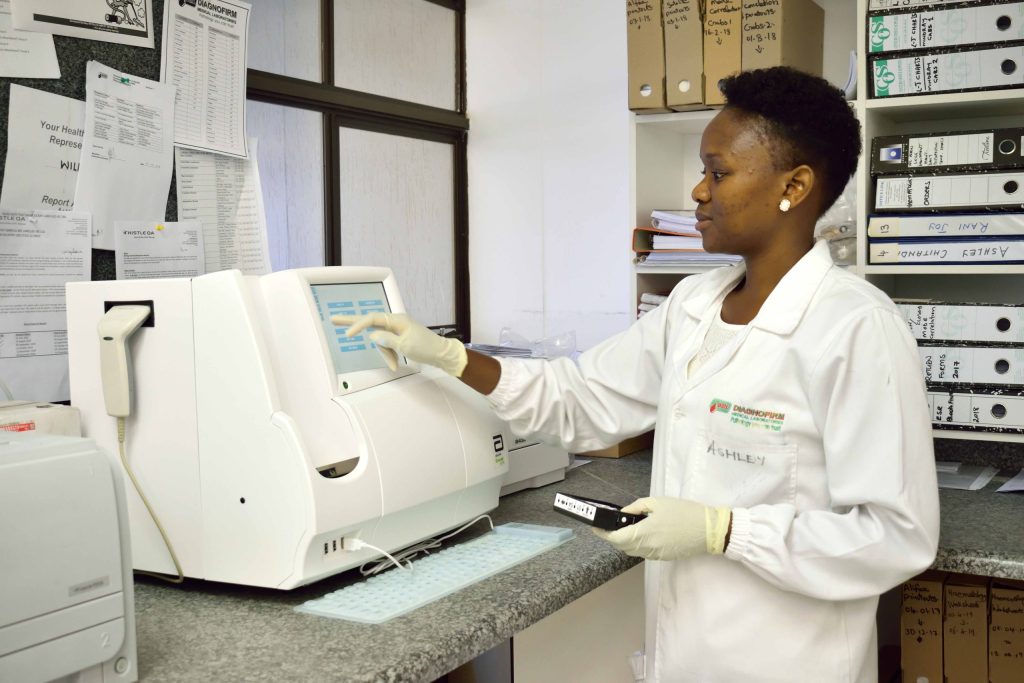Haematology
It is not what we can do, but we will do – a cut above!
Haematology
Haematology (hema- is from the Greek word for ‘blood’) is the study of blood with regards to a person’s health or disease. It includes blood, blood-forming organs, and the proteins involved in bleeding and clotting. Our Haematology Laboratory provides routine and urgent automated blood counting and morphological profiling, coagulation screening, specialist haemostasis and haemoglobinopathy investigations
Haematological tests can evaluate numerous conditions involving blood and its components. They can also be used to diagnose inflammation, anaemia, infection, haemophilia, blood-clotting disorders, leukaemia, and response to chemotherapy, among many other things.

Full Blood Count Test
A Full blood count (FBC) measures several components and features of your blood. An FBC and its individual components are tested on whole blood. It can include measurements of the following:
White Blood Cells
White blood cells (WBC) make up the body’s primary defence system, and knowing their number is an important tool in diagnosing and monitoring infection and leukemic disorders. A normal WBC level is 4,500 – 11,000 per mm³ of blood.
Increased WBC levels are most notably found in those with any type of infection, but are also found in anaemia, collagen disorders, and those with physiologic stress, such as pregnancy. Low WBC levels are seen in malnutrition, rheumatic disorders (like lupus, arthritis), some viral infections, and those undergoing chemotherapy or other forms of bone marrow suppression.
Hemoglobin
Haemoglobin (hgb) is the oxygen-carrying protein in red blood cells. Haemoglobin levels are a direct reflection of the amount of oxygen in the blood. A normal haemoglobin concentration is 11-15 grams per deciliter of blood.
Increased HgB is seen in those with dehydration, chronic obstructive pulmonary disease, or COPD, and congestive heart failure, or CHF, and those at high altitude. A decreased HgB value is seen in anaemia, blood loss, liver disease, as well as leukaemia and lymphomas.
Red Blood Cells
Red blood cells (RBC) are responsible for the transport and exchange of oxygen. Measurement of RBCs is important in monitoring the effects of blood loss and the progression of chronic disease. Normal counts of RBCs are 3,900,000 – 5,800,000 per mm³ of blood.
RBC values are increased in those with anxiety or stress, bone marrow failure, and dehydration. A decreased RBC value will be found in those with chronic inflammatory diseases, chemotherapy patients, anaemia, blood loss, and many cancers.
In addition to a count of WBCs and RBCs, a complete blood count can include further tests to evaluate the size, weight, and shape of those cells. These more detailed tests are helpful in diagnosing and monitoring therapy for cancer and anaemic patients.
Haematocrit and Platelets
Haematocrit (HCT) is the proportion of red blood cells to plasma, the fluid component of your blood. HCT helps to evaluate anaemia and hydration. A normal percentage of haematocrit is 33 to 49%. The increase and decrease levels of HCT mirror those of haemoglobin. RBC, HgB, and HCT tests parallel each other and are frequently used together to evaluate anaemia.
Platelets (PLT) have an essential function in blood clotting. A normal value is 150,000 – 450,000 platelets per mm³ of blood. An increased platelet value is seen in conditions that involve inflammation, such as acute infection, trauma, and some malignant cancers. A decreased platelet count is found in alcohol toxicity, anaemia, blood loss, infection, many congenial conditions, and coagulation disorders.
Special Tests
These include:
Coagulation section where the following tests are provided:
- Monitoring treatment by the APTT and INR respectively.
- Platelet function tests including the bleeding time.
Thrombophilia screen, including the lupus anticoagulant, anti-thrombin III, protein S, protein C, resistance to activated protein C and anti-cardiolipin antibody.
The diagnosis and management of either congenital or acquired bleeding disorders; the former include haemophilia, the latter the bleeding problems in the critically ill, of obstetric patients and those with liver failure.
Special Investigations sent to referral laboratories
- Erythropoietin
- HLA typing/tissue typing service
- Red cell enzyme studies including G6PD levels.
- Haemoglobin electrophoresis for sick cell anaemia screen and thalassaemia screen.
- Other special investigations include special stains for haematological malignancies.
- Cytogenetics of peripheral blood and bone marrow in presumed bone marrow disorders.
Cell surface marker studies on peripheral blood and bone marrow particularly helpful in differentiating between a reactive polyclonal and a monoclonal neoplastic lymphocytosis.
Results from routine blood count and simple coagulation tests are available, usually on the day of receipt of the sample and invariably within 24-hours.

